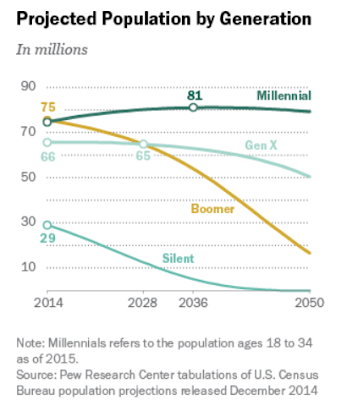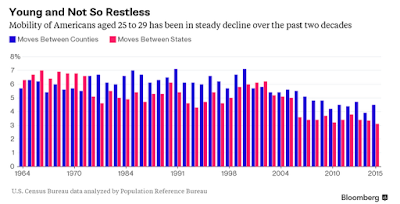Millennials Overtake Boomers
According to Pew Research Millennials will overtake Baby Boomers this year.
This year, the “Millennial” generation is projected to surpass the outsized Baby Boom generation as the nation’s largest living generation, according to the population projections released by the U.S. Census Bureau last month. Millennials (whom we define as between ages 18 to 34 in 2015) are projected to number 75.3 million, surpassing the projected 74.9 million Boomers (ages 51 to 69). The Gen X population (ages 35 to 50 in 2015) is projected to outnumber the Boomers by 2028.

Why are So Many Millennials Still in the Basement?
Bloomberg has some interesting charts and commentary in its report Here’s Evidence That Millennials Are Still Living With Their Parents.
In 2015, 15.1 percent of 25 to 34 year olds were living with their parents, a fourth straight annual increase, according to an analysis of new Census Bureau data by the Population Reference Bureau in Washington. The proportion is the highest since at least 1960, according to demographer Mark Mather, associate vice president with PRB.

The tough job market for young people since the recession ended in June 2009 is also contributing to a lower mobility rate. Adults under 30 are typically the most mobile part of an American workforce, constantly on the move since the 19th century. That mobility has been seen as a key advantage of the flexible U.S. labor market compared with places like Europe.
The latest Census data show just 3.1 percent of Americans from 25 to 29 relocated in the last year between states, just half the share of 2002. While moves between counties in the same state — less likely to be for jobs — have increased some, they too remain below pre-recession levels, according to PRB’s analysis.

Goldman Sachs economists, who examined the phenomenon of “kids living in the basement” in an August report, found a few reasons to explain it.
Millennials, the 82 million people born between 1981 and about 2000, have been plagued by chronic underemployment since the recession — consider the college grad working as coffee barista — and rising student debt is proving to be a lasting burden.
“Above-average youth underemployment rates alone account for about one-third of the increase in the share of young people living with their parents, and lagged effects of the recession probably account for a bit more,” Goldman’s David Mericle and Karen Reichgott wrote.














Leave A Comment